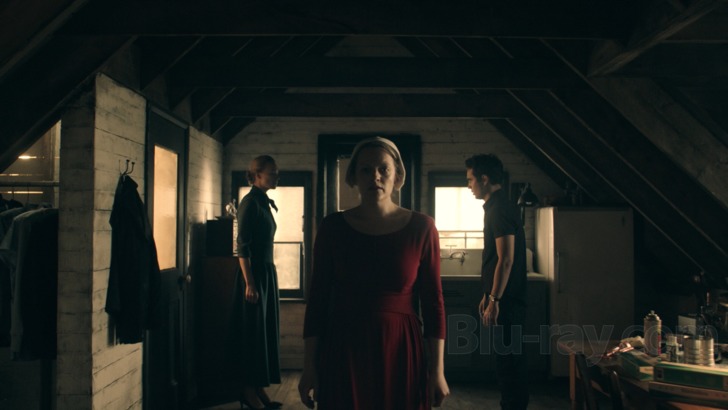The Handmaid's Tale: Season One Blu-ray Movie
HomeThe Handmaid's Tale: Season One Blu-ray Movie 
20th Century Fox / MGM | 2017 | 525 min | Rated TV-MA | Mar 13, 2018
Movie rating
7.1 | / 10 |
Blu-ray rating
| Users | 0.0 | |
| Reviewer | 4.0 | |
| Overall | 4.0 |
Overview
The Handmaid's Tale: Season One (2017)
Set in a dystopian future, a woman is forced to live in sexual servitude under a fundamentalist theocratic dictatorship.
Starring: Elisabeth Moss, Yvonne Strahovski, Joseph Fiennes, Max Minghella, Amanda BrugelDirector: Reed Morano, Mike Barker (I), Kari Skogland, Kate Dennis, Floria Sigismondi
| Thriller | Insignificant |
| Sci-Fi | Insignificant |
| Drama | Insignificant |
Specifications
Video
Video codec: MPEG-4 AVC
Video resolution: 1080p
Aspect ratio: 1.78:1
Original aspect ratio: 2.00:1
Audio
English: DTS-HD Master Audio 5.1 (48kHz, 24-bit)
German: DTS 5.1
Subtitles
English SDH, French, German, Spanish
Discs
Blu-ray Disc
Three-disc set (3 BDs)
Playback
Region free
Review
Rating summary
| Movie | 4.5 | |
| Video | 4.5 | |
| Audio | 4.0 | |
| Extras | 1.0 | |
| Overall | 4.0 |
The Handmaid's Tale: Season One Blu-ray Movie Review
Know Your Place
Reviewed by Michael Reuben April 28, 2018Hulu's multi-Emmy-winning original series, The Handmaid's Tale, had remarkable timing.
Although creator/writer/producer Bruce Miller (The 100) began to develop the show in 2015, its
production coincided with America's 2016 presidential election, which was accompanied by
searching—and often acrimonious—debate about the state of democracy both at home and
abroad. The election brought new attention to America's complex relation between religion and
politics, which is now being probed, adjusted and negotiated more openly than at any time in
recent history. A few months after the release of Season One's final episode on June 14, 2017,
the explosion of the #MeToo movement prompted renewed focus (and intensified militance) over
the treatment of women in contemporary society, especially by men in positions of power.
All of these hot-button contemporary topics lie at the heart of Handmaid, which makes it even more remarkable that it’s been over
thirty years since Margaret Atwood wrote the novel of which Miller’s series is a relatively faithful adaptation. The Canadian author’s dystopian tale
had been previously adapted for the
screen in 1990 with a script by Nobel Prize-winning writer Harold Pinter, direction by acclaimed
German filmmaker Volker Schlöndorff (The Tin
Drum) and a talented cast led by Robert Duvall,
Faye Dunaway and the late Natasha Richardson. But the film lacked the cautionary bite of
Atwood's book, and Miller rightly sensed that it would take more than a two-hour movie to fully
explore the author's spookily prescient vision. The ten episodes of Handmaid's first season,
which range from under fifty minutes to over an hour, gave Miller and his creative team
sufficient room to build out Atwood's elaborately imagined vision of a totalitarian society
organized around the strict control of women's reproductive functions. Season One of Handmaid
examines that world and the people who inhabit it with an intensity that is often painful to
watch—but so compelling that you can't look away.
The serialized TV format has also allowed Miller and his team to create opportunities for
expanding Atwood's world beyond the scope of the original novel. By the end of Season One,
Handmaid had covered most of the book's events. In Season Two, which Hulu has just begun
streaming, the series launches into previously unseen realms. (Atwood serves as a
producer and creative consultant.)
Handmaid is co-produced by MGM's television division, which has released Season One on Blu-ray through its distribution deal with
Fox. For anyone without a Hulu subscription, the Blu-rays
offer a first-rate opportunity to experience a series that made history by becoming the first
streamed content to win the Emmy for Outstanding Drama Series (plus seven additional awards,
including Lead Actress Elisabeth Moss). Blu-ray purchasers also receive the benefit of the
show's full 5.1 soundtrack, which Hulu viewers cannot currently enjoy, because the service is
still limited to stereo sound.

Handmaid is set in an indefinite near future where a revolutionary movement known as the Sons of Jacob has overthrown the United States and replaced it with a strictly ruled and heavily regimented theocracy called the Republic of Gilead. Extensive, well-organized and apparently well-financed, the Sons of Jacob have constructed a governing philosophy from carefully selected Biblical passages, with emphasis on the Old Testament, and Gilead has outlawed all other forms of religion, pointedly demolishing even the grandest of Catholic cathedrals so that no trace of any competing faith remains. Daily life has been prescribed and routinized, down to the greetings that citizens exchange when they pass each other in the street. Dissidents are routinely arrested by the secret police known as "the Eye", and public executions are so frequent that citizens have become accustomed to the sight of hooded bodies hanging from walls as they go about their daily activities. Each swinging corpse is a warning: Obey, or suffer the consequences.
The crisis that helped power the Sons of Jacob to domination was a sharp worldwide drop in fertility, with most women either unable to conceive or failing to carry their offspring to term. In response, Gilead has declared any woman of proven fertility to be an essential resource nationalized by the state. All such women are seized, imprisoned and retrained for a new life of servitude by matrons designated as "aunts". As merciless as the strictest drill sergeant, aunts are allowed to exercise extreme brutality against their charges, as long as the precious reproductive organs remain undamaged. (Other body parts are dispensable.) These enslaved women are called "handmaids", and they are instantly recognizable by their red dresses and white hats, just as other castes in Gilead are marked by designated uniforms. But handmaids suffer the additional indignity of having marker tags stapled through their left ears, confirming their status in Gilead as prized cattle.
Each handmaid is assigned to the household of a ruling member of the Sons of Jacob, or "Commander", where she is ritually raped by the Commander while being held by the Commander's wife. The wife's participation is designed both to legitimize the procedure and to ensure that the Commander expresses no emotion toward the handmaid and experiences no pleasure from the act. In theory, an emotional exchange is supposed to occur between the Commander and his wife, with the handmaid as an impersonal conduit. (Not surprisingly, Commanders frequently cheat, in ways both big and small.) When a handmaid does become pregnant, she is cared for until she delivers and the baby is weaned, at which point the child is taken by the Commander's family, and the handmaid is reassigned elsewhere to begin the cycle anew.
Handmaid is told primarily from the point of view of June Osborne (Elisabeth Moss, Mad Men), who as the series opens, is attempting to flee to Canada with her husband, Luke (O. T. Fagbenle), and their young daughter, Hannah (Jordana Blake). But June is apprehended and separated from her family, whose fate remains unknown (though she hears a shot that she interprets as Luke's execution). After training by the terrifyingly severe Aunt Lydia (Ann Dowd), June is placed in the home of Commander Fred Waterford (Joseph Fiennes) and his wife, Serena (Yvonne Strahovski). Like all handmaids, she is rechristened so that even her name reflects her servitude to her Commander: "Offred" (or "Of Fred"). With every facet of her life regulated and prescribed, June spends much of her time alone, except when she is summoned to gatherings of handmaids for some official purpose, which almost always involves something unpleasant. Her meals are provided by the household's servant, Rita (Amanda Brugel), whose rank is that of "Martha". She is allowed daily trips to the outside world to do the family's grocery shopping, but only in the company of another handmaid, who is initially Emily, or "Ofglen" (Alexis Bledel). The Waterfords' chauffeur, Nick (Max Minghella), watches June from a distance, but she is warned early on that Nick must be treated with extreme caution, because he is a member of the Eye.
Handmaid derives much of its drama from the interplay between the painfully docile and obedient exterior that June must maintain to avoid punishment and the uncensored voiceover in which she vents her anger, fear, loneliness and countless other thoughts and emotions boiling inside her as she resists Gilead's efforts to reduce her to mindless livestock. Moss's performance is a triumph of silent acting, her face registering multiple layers of emotion, even when her voiceover is silent. As the season progresses, June encounters unexpected layers in Gilead, including a rebel underground, whose members live in constant peril, and a secret alternative culture in which the elite of Gilead are allowed to indulge in forbidden pleasures, as long as they continue to maintain a credible pretense of observing the strict rules they prescribe for the rest of society. Commanders' wives turn out to have their own secrets as well. In later episodes, we see Gilead from perspectives other than June's, including flashbacks that reveal how the Sons of Jacob planned their rise to power. But it is June's perspective, and Moss's portrayal, that holds Handmaid together. She keeps reminding us that what we're experiencing is a slowly unfolding horror movie in which the monsters are all too human.
Handmaid is relentless in its depiction of the soul-crushing mechanisms of oppression deployed throughout Gilead, and it is scarily convincing in demonstrating how organized rape, torture and murder can be made to seem ordinary, acceptable and just. Margaret Atwood has said that she based Gilead on aspects of early New England Puritanism, as well as 20th Century regimes like Cambodia's Khmer Rouge, Romania under Nicolae Ceauşescu and Iran after the overthrow of the Shah. But if Handmaid demonstrates anything, it is that unchecked power is a relentless adversary in any time and place. Miller and his creative team effectively utilize cinematic techniques of suspense to draw out sequences in Handmaid where the viewer knows that something terrible is about to happen, intensifying and prolonging an overwhelming sense of dread to convey the harsh reality of June's dehumanized existence. Her daily life is infused with jagged discomfort and agonizing despair, occasionally broken by unexpected acts of kindness, glimmers of hope and tiny expressions of defiance. That defiance erupts into open revolt by the Season One finale, and only Miller and his creative team know where June's resistance may lead.
The Handmaid's Tale: Season One Blu-ray Movie, Video Quality 

The principal cinematographer on The Handmaid's Tale is Colin Watkinson, whose work with
director Tarsem Singh on The Fall and Emerald City established his talent for creating
surreal
imagery. Like its costumes and production design, Handmaid's digital cinematography is highly
stylized, with scenes in present-day Gilead featuring artfully composed frames and tableaus
(which Watkinson has described as "Kubrick-esque") and flashbacks shot in a handheld, cinéma
vérité style. The palette has been subtly desaturated throughout. In Gilead, specific colors
(notably, blue) have been purposefully leached from the environment, so that the reds of the
handmaids' uniforms leap off the screen, even though they are relatively modest in intensity.
Scenes inside the Waterford house are frequently dark and shadowy, while "public" locations
such as hospitals and supermarkets are brightly lit with surreal clarity. Nowhere in Gilead does
anything look natural, which establishes a sharp visual contrast with flashbacks depicting a pre-Gilead society. Colors in those scenes are faded, as if
Gilead were slowly erasing such memories, but they remain far more life-like.
As with a number of other streaming originals (e.g., Star Trek:
Discovery), Handmaid is shown by Hulu at an aspect ratio of 2.00:1, with thin black bars above and below. For
its Blu-ray presentation, MGM has opened up the image to fill the entire 1.78:1 standard HD
frame. As far as I can tell, there has been no cropping, only a small addition of picture
information at top and bottom.
MGM's 1080p, AVC-encoded Blu-rays effectively present Handmaid's nightmarish alternative
reality, capably reproducing the detail of the show's production design, which is deliberately
spare and severe (with occasional exceptions for flashbacks and specialized environments in the
present). Sharpness is excellent, though not overassertive, and densities accurately reflect the
photography's minimalist aesthetic. Fine detail tends to drop off in dark interior scenes, but this
is by design. The image is free from aliasing, banding or other interference. MGM has spread the
ten episodes of Season One over three BD-50s, with two discs containing four episodes each and
a third with the final two episodes, plus extras. The average bitrates on the first two discs are a
little under 23 Mbps, while the final two have generous averages near 35 Mbps. The compression
appears capable throughout, with no artifacts or anomalies.
The Handmaid's Tale: Season One Blu-ray Movie, Audio Quality 

Hulu streams The Handmaid's Tale in stereo, but the Blu-ray discs have a 5.1 soundtrack encoded in lossless DTS-HD MA. The discrete multi-channel formatting improves the clarity and prioritization of dialogue, and it allows for the occasional discrete rear channel effect. But the chief beneficiary of the 5.1 encoding is the atmospheric and spooky score by Adam Taylor (August: Osage County), which artfully uses isolated string instruments and minimalist cues with sustained individual notes to contribute to Handmaid's near-constant sense of foreboding. Handmaid is the rare serialized drama where the musical score doesn't simply underline big emotional moments but fully blends with the rest of the show's elements to become an essential part of the series' environmental texture. The 5.1 mix gives the score room to breathe, making it all the more unsettling and effective.
The Handmaid's Tale: Season One Blu-ray Movie, Special Features and Extras 

The extras can be found on disc 3.
- Script to Screen: The Salvaging (1080p; 1.78:1; 8:01): Bruce Miller discusses the practical and emotional complexities of a critical sequence from the pilot episode, with contributions from director Reed Morano and actresses Elisabeth Moss ("June/Offred"), Ann Dowd ("Aunt Lydia") and Madeline Brewer ("Janine").
- Hope in Gilead (1080p; 1.78:1; 5:32): Miller, Moss, novelist Margaret Atwood and others provide an overview of the series. Atwood's observations are particularly noteworthy.
The Handmaid's Tale: Season One Blu-ray Movie, Overall Score and Recommendation 

It's interesting to compare The Handmaid's Tale to another currently popular TV series that, at
first glance, appears to have little in common with Miller's and Atwood's dystopian creation.
Both Handmaid and Westworld
portray imaginary societies in which a privileged class enjoys
complete hegemony over a group of conscious beings designated as property. Both series
examine the barbarous and corrosive effects of such power on those who exercise it, and in both
series we routinely experience that power from the victims' point of view. But in Westworld,
there's no cumulative result (at least initially), because the victims' memories are constantly
being wiped clean of the atrocities committed against them. Handmaid doesn't indulge in such
luxuries, as June and her fellow handmaids suffer day after day of hopeless enslavement and abuse. Some
let their identities be obliterated, some go insane, and a few take their own lives. June becomes
the heroine of Handmaid, because she manages to find faint rays of hope in a place where hope
should be extinguished. Discomforting, but highly recommended.
Other editions
The Handmaid's Tale: Other Seasons
Similar titles
Similar titles you might also like

Children of Men
2006

The Handmaid's Tale
1990

Bushwick
2017

The Darkest Minds
2018

Fahrenheit 451
2018

Miss Sloane
2016

Z.P.G.
Zero Population Growth
1972

No Escape
2015

The Mortal Storm
Warner Archive Collection
1940

49th Parallel
1941

Topaz 4K
1969

Into the Forest
2015

Wolf Lake
1980

Page Eight
Masterpiece Classic: Page Eight
2011

Zipper
2015

Gimme Shelter
2013

First Reformed
2017

Ejecta
2014

Twilight's Last Gleaming
Nuclear Countdown
1977

The Contender
2000

